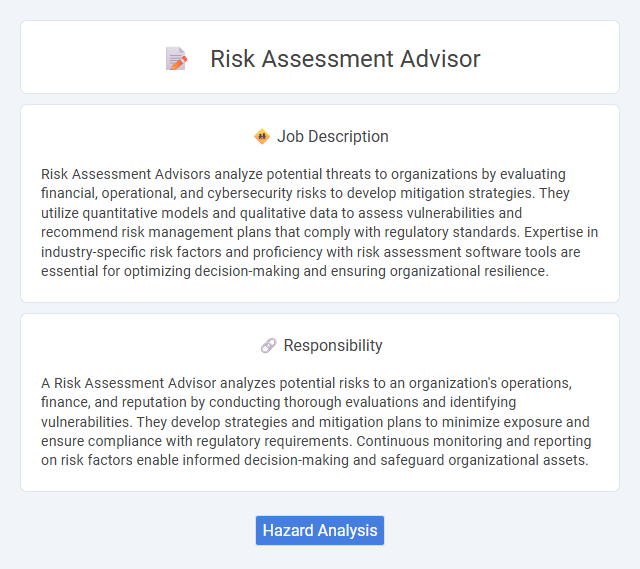
Risk Assessment Advisors analyze potential threats to organizations by evaluating financial, operational, and cybersecurity risks to develop mitigation strategies. They utilize quantitative models and qualitative data to assess vulnerabilities and recommend risk management plans that comply with regulatory standards. Expertise in industry-specific risk factors and proficiency with risk assessment software tools are essential for optimizing decision-making and ensuring organizational resilience.
Individuals with strong analytical skills and attention to detail are likely suitable for a Risk Assessment Advisor role, given the job's requirement to evaluate potential hazards and develop mitigation strategies. Those who remain calm under pressure and possess effective communication abilities may adapt well to the challenges of interpreting complex data and advising stakeholders. Candidates lacking critical thinking or who struggle with ambiguity might find this position less fitting due to the need for precise judgment and decision-making in uncertain scenarios.
Qualification
A Risk Assessment Advisor must possess strong analytical skills and expertise in risk management frameworks such as ISO 31000 or COSO. A bachelor's degree in finance, business administration, or a related field is typically required, with certifications like Certified Risk Manager (CRM) or Financial Risk Manager (FRM) enhancing qualifications. Proficiency in data analysis tools, regulatory compliance, and industry-specific risks is essential for effective risk evaluation and mitigation.
Responsibility
A Risk Assessment Advisor analyzes potential risks to an organization's operations, finance, and reputation by conducting thorough evaluations and identifying vulnerabilities. They develop strategies and mitigation plans to minimize exposure and ensure compliance with regulatory requirements. Continuous monitoring and reporting on risk factors enable informed decision-making and safeguard organizational assets.
Benefit
A Risk Assessment Advisor likely enhances organizational decision-making by identifying potential threats and recommending strategies to mitigate them, which may reduce financial losses and improve safety. Their expertise probably supports compliance with regulatory requirements, minimizing legal risks and enhancing the company's reputation. Employing such a professional tends to increase stakeholder confidence through proactive risk management and strategic planning.
Challenge
Risk Assessment Advisor roles probably involve navigating complex regulatory environments and rapidly evolving threats, requiring keen analytical skills and adaptive strategies. They likely face challenges in accurately predicting potential risks amidst uncertain data and changing market conditions. Success in this job probably depends on continuous learning and proactive problem-solving to mitigate potential impacts effectively.
Career Advancement
Risk Assessment Advisor roles offer significant opportunities for career advancement by developing expertise in identifying, analyzing, and mitigating organizational risks. Mastery in regulatory compliance, risk modeling, and data analytics positions professionals for leadership roles such as Risk Manager or Chief Risk Officer. Continuous skill enhancement and industry certifications like Certified Risk Manager (CRM) accelerate progression within the risk management career pathway.
Key Terms
Hazard Analysis
Risk Assessment Advisors specialize in identifying and evaluating potential hazards within various operational environments to mitigate safety risks. They implement hazard analysis techniques such as Failure Mode and Effects Analysis (FMEA) and Hazard and Operability Study (HAZOP) to systematically assess risks and develop comprehensive mitigation strategies. Expertise in regulatory compliance and industry standards ensures that companies maintain safe practices and minimize exposure to operational hazards.
 kuljobs.com
kuljobs.com